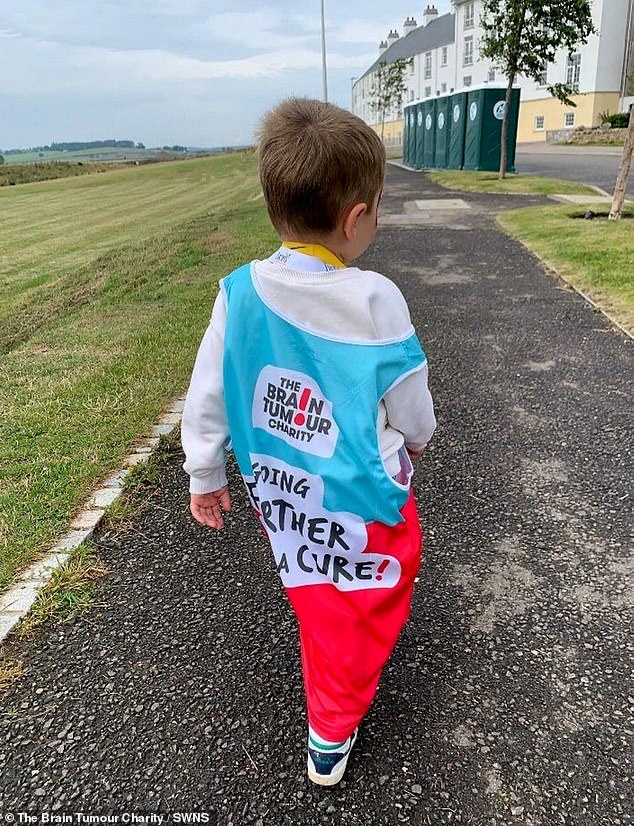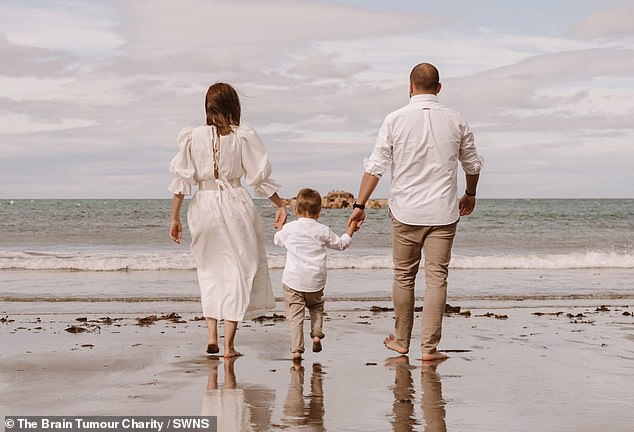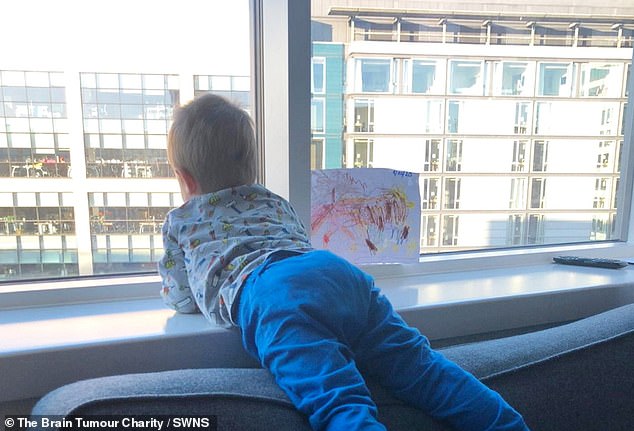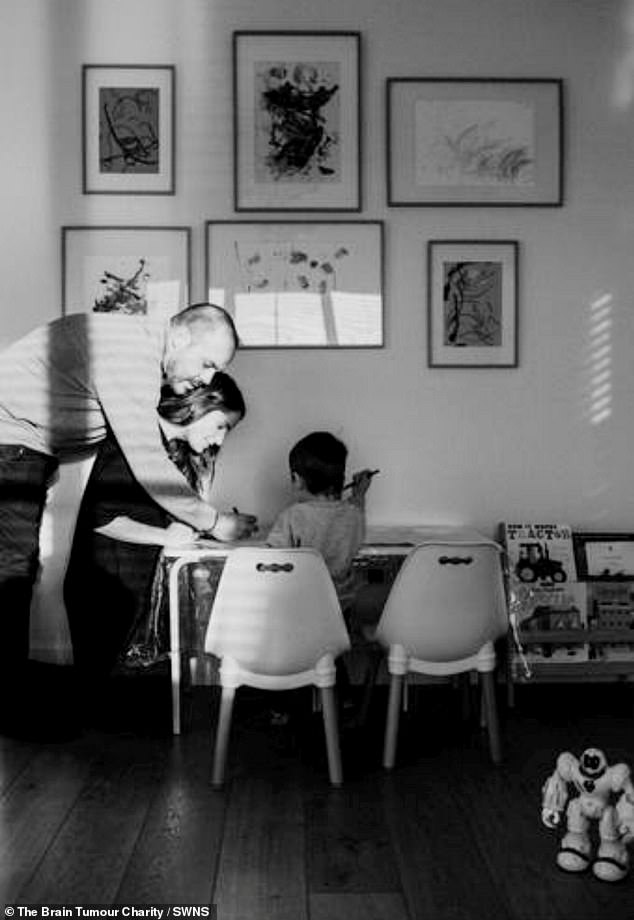Our toddler’s stomach bug turned out to be an incurable brain tumour: Parents agony that after three ops and 13 rounds of chemo their boy, now six, might not survive another year
A toddler was diagnosed with an incurable brain tumor the size of a tennis ball after his parents thought he had a “stomach virus.”
Just ten days after his first birthday, Lucas Garcia-Batalla was diagnosed with grade 3 anaplastic ependymoma, a fast-growing malignant tumor.
His diagnosis came as a “shock” to his parents David Garcia Jurado, 42, and Laura Batalla, 38, from Stonehaven, Aberdeenshire.
They assumed that Lucas, who is now six, had a stomach virus just before his first birthday in 2019, which left him listless, vomiting and losing his appetite.
But even after three major brain surgeries, thirteen months of chemotherapy and two months of proton therapy, the tumor continues to grow.
After a CT scan revealed Lucas had a grade 3 anaplastic ependymoma, he was transferred to the Royal Hospital for Children and Young People in Edinburgh, where he underwent a 10-hour operation to remove the tumour, which was successful.

Lucas’ parents thought he just had a stomach virus because he was vomiting, listless and had lost his appetite.

Just ten days after his first birthday, Lucas Garcia-Batalla was diagnosed with grade 3 anaplastic ependymoma, a fast-growing malignant tumor. His diagnosis came as a ‘shock’ to his parents David Garcia Jurado, 42, and Laura Batalla, 38, from Stonehaven, Aberdeenshire (pictured)
Mr Garcia Jurado said: ‘Just before his first birthday, Lucas was ill.
‘He didn’t have much of an appetite, but we thought it was a stomach virus.
“He kept throwing up, he was listless and everything was happening so fast. It wasn’t slow.”
‘A few days later, a CT scan revealed a huge tumor on the back of his head, the size of a tennis ball.
“That was a very dark moment for me. I still have the image in my head of my wife holding Lucas and telling us he had a brain tumor.”
After a CT scan revealed that Lucas had a grade 3 anaplastic ependymoma, he was transferred to The Royal Hospital for Children and Young People in Edinburgh, where he underwent a successful ten-hour operation to remove the tumour.

Despite Lucas’ successful surgery, he suffered a relapse in September 2020, three months after completing his chemotherapy
Mr Garcia Jurado said: ‘His first surgery took place just two days after his diagnosis.
‘They were able to remove everything, it was a successful operation.
‘Lucas then had chemotherapy for 13 months, after which an MRI was fine — he was cured.’
Ependymomas are According to the Brain Tumour Charity, this is the most common brain tumour in children, with the average age of diagnosis being five.
In the UK, approximately 30 children are diagnosed with ependymoma each year.
Grade three ependymomas (anaplastic ependymomas) grow quickly and usually grow in the cerebral hemisphere, the area of the brain that controls balance, movement, breathing, and blood pressure.
Loss of balance, clumsy movements, headaches, nausea and seizures are all characteristic symptoms.
Despite Lucas’ successful surgery, he suffered a relapse in September 2020, three months after completing his chemotherapy.
He underwent further surgery and was transferred to the Christie Hospital in Manchester, where he received two months of proton therapy, a form of radiotherapy.
Mr Garcia Jurado said: ‘We had hope for a year, but in December 2021 he had another relapse.
‘In March 2022, he underwent palliative surgery to remove the tumor, which was also successful.
‘Then, in January 2023, he underwent experimental Gamma Knife surgery, a form of radiation therapy.
“It is the first time that something like this has been done to a four-year-old to stop or slow growth for a certain period of time.”
Unfortunately, an MRI scan in June 2023 showed that the tumor was still growing.
Mr Garcia Jurado said there are no more treatment options for Lucas and they aim to give him the best life possible.

Unfortunately, an MRI scan in June 2023 showed that the tumor was still growing. But now his parents are focused on giving Lucas a ‘normal life’.
He said, ‘There are no options left for him, how many times can you open his head and operate on him?
‘During his entire journey, the most important thing is to keep him alive, but the side effects are really severe.
‘Lucas is blind in his right eye and deaf in his left ear.
“It’s a miracle he was able to go to school. He has a great sense of humor, it’s unbelievable.
“You wouldn’t believe what he’s been through.”
The father fears that the tumor is just a ‘ticking time bomb’ and that Lucas only has a year left to live.
But he learns to ‘live with uncertainty’ and focuses on ‘enjoying the moment’ so that Lucas can lead a ‘normal life’.
Catherine Fraher, director of services and digital health at The Brain Tumour Charity, said: ‘We are incredibly grateful to everyone who shares their often heartbreaking story to raise awareness of brain tumours.
‘We know that every family deals with a brain tumor diagnosis and its aftermath in their own unique way.
‘That’s why The Brain Tumour Charity offers support to anyone who needs it. It’s so important that they know they’re not alone.’
